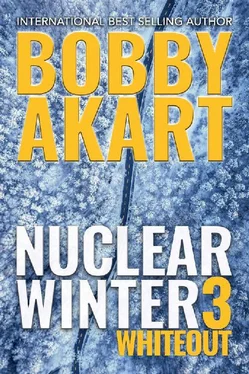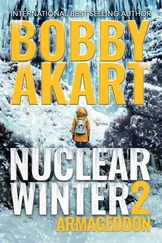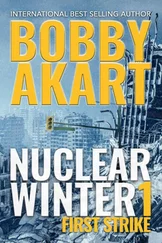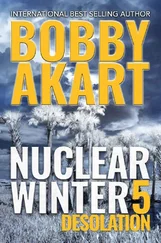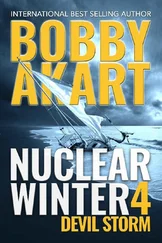He joined a pack of refugees shuffling past the aqueduct’s pump station. Fresh water was pumped to the Florida Keys through a series of aqueducts connected to a one-hundred-thirty-mile-long water main. It was the only source of fresh water and was used by the Albright family to fill its own water tower on Driftwood Key. Now, with the power grid down, the pump station wasn’t working, causing survival in the Keys to be even more improbable for most people.
He walked another thousand feet until Barnes Sound was on his left. Because of the darkness, he couldn’t see across the fairly large body of water toward the toll bridge. As the people in front of him began to bunch together, waiting their turn to enter the Keys, he realized he was more than a mile away. He shook his head in disbelief and prepared himself to wait hours for the opportunity to enter.
As he shuffled along with the others, he continued to eavesdrop on conversations. He was amazed at the quest for information. For many, it appeared to be more important than food and water. Misinformation seemed to run rampant as well.
Rumors of more nuclear missile strikes on U.S. soil were common. Confirmation of Mexico shutting out American refugees was confirmed by a number of people. Texas had closed off their borders to outsiders. It was believed they were still operating their power grid without a single blackout episode.
None of them seemed to be aware of the National Guard presence at the speedway. He didn’t dare ask, as he preferred not to draw attention to himself. However, when nobody made reference to it, he began to question the veracity of the teenage boys he’d spoken with.
Having witnessed the number of stalled cars on the Overseas Highway coupled with the throngs of people making their way in both directions in the middle of the night made him wonder how they’d cross the sound to begin with. And if the barricades were in place as the teens said, that bridge would be impassable without a significant amount of work by some heavy-duty Caterpillar front-end loaders.
The wave of refugees came to an abrupt halt, and they began to bunch together. Some eased down the embankment and fought along the mangrove trees to cut ahead of the others. This drew the ire of some, and hostile words were exchanged.
Peter noticed the number of refugees heading off the Keys was less, so he sat on the concrete barrier and swung a leg over to the other side, followed by the other. To avoid walking against the flow of pedestrian traffic, he opted to shuffle along the silt fence separating the soft, sandy shoulder and the riprap that prevented it from washing into the water. He was moving much faster than the other side of the road, and soon others joined him.
Pushing and shoving broke out as those who felt people like Peter were cutting in line tried to stop them. Shouts filled the air, and a couple of fistfights resulted in a near brawl next to a stranded DHL delivery van.
As daylight came, Peter pressed forward despite being shoved ever closer toward the water’s edge. He gripped his pistol and contemplated pulling it so he could defend himself. The melee, however, was on the other side of the barrier as people began to push forward, crushing those ahead of them into those standing in line.
Raised voices broke the relative silence he’d enjoyed until this point. People were scared and agitated. The shouting and fighting rose to a crescendo until a single sound quietened everyone, stifling their voices.
An explosion rocked the waters of Barnes Sound. A massive blast sent a fireball high into the air from the direction of the Monroe County Toll Bridge. The sound of concrete crumbling and the extremely heavy concrete barriers falling into the water roared across the glass-like water.
Then the hundreds of people surrounding Peter reacted. As if on cue, in unison, they screamed at the top of their lungs. Voices shouted out warnings.
“They’re bombing us!”
“It’s the Air Force!”
“There’s gonna be a tidal wave!”
“Run!”
A panicked stampede was headed Peter’s way. Some people from the right side of the road jumped the barrier and began to flee the Keys. Those who were already shuffling their way to the mainland ran for their lives.
He was at risk of being trampled, so he stepped over the silt fencing and found a gap in a guardrail that marked the last thousand feet before the access road entrance came into view.
Peter didn’t know what had happened, and he doubted anybody’s air force had bombed the bridge or the pedestrians on it. He did see an opportunity to use the chaos as a way of getting to the front of the line. He considered it to be his best opportunity to get onto Key Largo.
Or die trying.
Tuesday, November 5
Mount Weather Emergency Operations Center
Northern Virginia
It was during the predawn hours of November 5 when the president assembled his military leaders. His day was filled with meetings and included his first encounter with the outside world since the nuclear attacks. Marine One, the presidential helicopter, was going to take him on a tour of Washington, DC, followed by a flyover of Philadelphia. He wanted to end his day on a positive note.
The president’s first meeting was with Chandler and his military leaders about the progress they were making toward his goal of establishing a new center of government in Pennsylvania. In order to secure the necessary facilities to house Congress and other government agencies, residents and businesses in downtown Philadelphia had to be displaced. This resulted in pushback in the form of violent protests that distracted the military from fulfilling the president’s directives. Many lives had been lost on both sides during the unrest, creating a boondoggle for President Helton.
During their briefing, the subject matter turned to the Florida Keys. The governor of Florida was no longer responding to the Helton administration’s attempts to intervene. Even direct communication attempts with Monroe County leaders failed.
“They’re calling themselves the Conch Republic, Mr. President,” said the chief of staff of the Army.
“You can’t be serious,” said the president sarcastically. “Are they actually claiming to secede from the Union?”
The general rolled his eyes and smiled. “Sir, they claim they already did many decades ago. Now they’re simply formalizing their declaration. Their words, not mine, sir.”
“Well, our nation, and this administration, will not be insulted by their insolent declarations of independence, or whatever’s on their minds. It’s insurrection against our government, and I want it quashed by whatever means necessary. I can’t allow this concept of a Conch Republic, or banana republic, to take hold. Texas is a difficult enough situation to deal with. Counties or geographic areas trying to assert their separation from our nation need to be dealt with harshly.”
The general continued. “Sir, as we speak, our troops are pulling out of the rally point in Homestead, halfway between Miami-Dade and the two bridges being held by the locals. We will use Army logistics bulldozers to force the concrete barriers off the bridges. Our troops, led by armored personnel carriers, will enter Key Largo. We suspect the locals will lay down their arms or run screaming into the night.”
The general had just finished his sentence and laughed along with the other military personnel in the briefing. Suddenly, one of his aides entered the conference room and interrupted their playful banter at the expense of the Florida Keys. He read the note and then nodded to his aide, who scurried out of the conference room.
“Mr. President, I’m afraid you’ll have to excuse me,” the general said as he rose from the table. “We have reports that the locals have detonated explosives under the supports of one of the bridges. A two-hundred-foot span has collapsed into the water.”
Читать дальше
